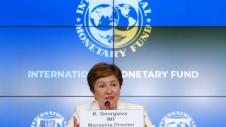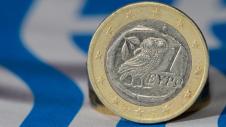Greek Finance Minister Christos Staikouras on Thursday presented the six priorities of the Greek economy amidst a turbulent geopolitical landscape, persistent high inflation and tighter monetary policy. In comments made during a meeting with visiting Managing Director of the European Stability Mechanism, Pierre Gramegna, Staikouras said these priorities were: safeguarding existing fiscal responsibility, dealing with the economic consequences of multi-layered crises by exploiting any available fiscal space, implementing structural changes, bringing forward the exploitation of Recovery and Resilience Fund's financing, addressing the problem of high, accumulated private debt and Greece's continued active participation, as it has been doing in the last 3.5 years, in the design of a new European economic architecture.
The Greek FinMin welcomed the ESM's new head in his first visit to Athens since taking over his post, saying it was proof of the importance that the ESM chief gives to continuing and further enhancing the regular, efficient and mutually beneficial cooperation between Greece and the ESM. Staikouras said that this cooperation will become even more productive and praised Gramegna's experience as finance minister of Luxembourg and a member of the Eurogroup during the difficult situations of the previous decade. Staikouras said the current situation was again crucial and full of challenges and noted that the Greek economy has managed to show remarkable resilience, strong dynamism and a positive outlook. He underlined that the Greek economy enjoyed 11 upgrades in the last three years and was only one step away from achieving investment grade, and could realistically achieve this goal in 2023.
The Greek finance minister said that Greece completed early repayment of its loans from the International Monetary Fund, sending a positive message to markets, it successfully exited enhanced surveillance status, prematurely repaid bilateral loans with Eurozone states and achieved the biggest reduction of public debt in the EU since 2019, with the general government's debt as a percentage of GDP falling by 50 percentage points in the last three years. He stressed that public finances returned to an environment of primary surpluses from this year, recording - according to the European Commission - the biggest fiscal improvement in Europe in the period 2021-2023. All these were the result of an efficient government policy and the common efforts of the citizens and the state since July 2019.
Staikouras said the ESM's role was very significant in the new economic architecture of the Eurozone and noted that no single European member-state is capable of dealing alone with the challenges of this new historic period, so that coordinated European action is therefore needed.
Gramegna, on his part, congratulated the Greek government, the people of Greece, and the Greek finance minister for the impressive results of the economy and noted that the ESM has been standing side-by-side with Greece for over a decade. "And it is great to see the remarkable progress that the country has made during this period. And the progress continued even in the face of new crises: first the pandemic and now the energy crisis spurred by the terrible war on Ukraine," Gramegna said, adding: "This is only possible because the country’s economy is structurally better prepared today to face uncertainties than it was before. Also due to the reforms that Greek governments have implemented in the last years.
But we need to stay vigilant. Preserving the strong gains of the past, keeping fiscal policy on a sustainable trajectory, and staying the course on reforms will help Greece’s economy to prosper. Doing all this is also essential for retaining the confidence of investors in the market. The ESM is a long-standing partner for Greece. We share Greece’s objective to generate prosperity for all Greeks, creating jobs, and helping the economy modernise and grow. This visit is also part of a broader consultation process with all ESM members I launched immediately after my appointment, which brings me to all euro area capitals. In our meeting, the minister and I exchanged views on how the ESM can best support its members and on how the ESM can continue to play a key role in the Economic and Monetary Union in the future. I would like to thank Minister Staikouras for the productive discussion and look forward to continuing our excellent cooperation."








